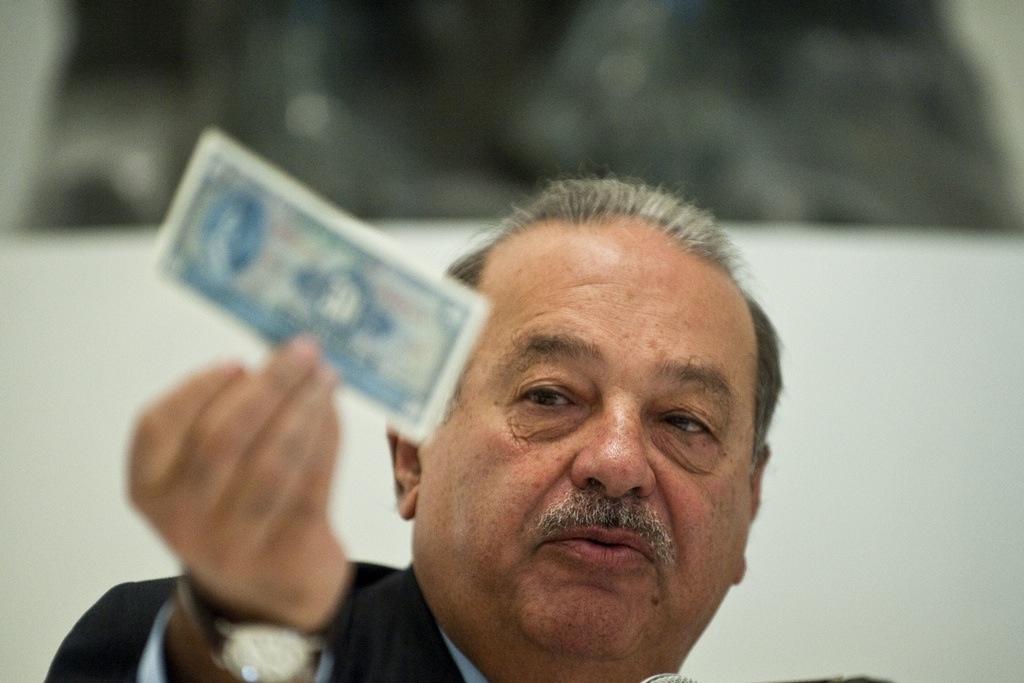Mexico’s billionaire brawl
Carlos Slim speaks during a press conference in Mexico City, on March 28, 2011.
MEXICO CITY, Mexico — Mexico’s billionaire club was long a snug circle of amigos, who respected each other's fiefdoms and kept cozy relations with the government.
At the top of the food chain sat the world’s richest man Carlos Slim, whose personal wealth was valued by Forbes at $71 billion. His companies control 80 percent of Mexico’s fixed phone lines and 70 percent of its mobile phones.
At his flanks were TV moguls Emilio Azcarraga and Ricardo Salinas Pliego who together entertain 95 percent of Mexico’s viewers of the small screen.
However, that peace and prosperity pact broke down this year, with Slim trying to plunge into the TV market while the television kings pushed into his sacred phone business.
GlobalPost in Mexico: Mexico's murder mayhem
The billionaire battle has flared in the courts this month as the two sides try new legal wrangling to break their rivals’ monopolies.
Rulings coming in the next two months could be crucial in determining the future of Mexican communications and how much monopolies can dominate the economy.
“Monopolies can do great damage. Mexico has some of the highest phone costs in the world, which is a big tax on business,” said Eleanor Fox, a global anti-trust expert at New York University. “The problem is that powerful monopolists seem to find their way around the law, whoever is president.”
President Felipe Calderon promised to knock Mexican monopolists down to size when he took office in 2006.
“It seems to me that public and private monopolies don't respond, necessarily, to a new world context, in which the interaction of consumers and products generate much bigger markets,” Calderon said in one of his first statements in power.
But as the president was occupied by an escalating drug war, tycoons maintained their domination of core industries.
The upcoming rulings could finally change that, with the billionaire brawl bringing the government into the fray.
Spurred on by the digital revolution, the TV giants have begun to offer packages that include cable networks, internet and phone lines.
On the other side, Slim has been making his own plans to launch cable and digital channels of news and entertainment while his phone companies have fought to keep their share of that market.
More from GlobalPost blogs: Is 'birth tourism' a myth?
In March, television duopoly Televisa and TV Azteca filed a complaint to the government antitrust agency arguing that Slim’s America Movil charges excessive amounts for other networks to call its phones.
Subsequently, the antitrust agency in April slapped America Movil with a record $1 billion fine.
However, Slim, a 71-year-old of Lebanese descent, has successfully overturned court decisions against his companies under the previous two Mexican presidents and is not about to go down lightly. America Movil filed a complaint that top antitrust commissioner Eduardo Perez Motta was politically motivated against Slim’s companies. The complaint was based on statements that Perez Motta made to the media describing the case.
A court in June ruled that Perez Motta should not be allowed to vote on an appeal of the fine. On Aug. 5, a second court upheld this decision.
The anti-trust analyst Fox said the latest ruling was a bad sign. “This seems very suspicious and political,” Fox said.
“All Perez Motta did was report what was happening.”
The TV companies launched a counter jab on Aug. 10, filing a complaint against the court’s decision.
However, Perez Motta’s position has already been shaken publicly.
On Wednesday, a commentator at a leading Mexican newspaper wrote a column arguing that Perez Motta should resign following the latest ruling.
Perez Motta “has lost moral authority. He should go,” David Paramo wrote in Excelsior. “He fell in love with his TV image and hearing his voice on the radio.”
America Movil’s appeal of the $1 billion fine will likely be ruled on by the end of September. Without Perez Motta, analysts speculate the case against America Movil will collapse.
Meanwhile, Slim’s companies have filed their own complaint against the TV companies for refusing to carry their advertising. A ruling on this complaint is also expected soon.
Down on the Mexican street, many view Slim’s continued domination as a foregone conclusion.
“Of course Slim is going to win. He runs everything,” said juice bar owner Gregorio Hernandez. “That is Mexico for you. The rich get richer and the poor struggle.”
High mobile phone costs have hit Mexico’s poor hard as the country has stumbled through its worst recession since the 1930s. At the same time, Slim’s fortune has mushroomed as he has used his profits from Mexico to buy up mobile phone networks across Latin America and in Spain.
Others view Slim as a shining example of what Mexicans can do.
“I wish there was a thousand more like him,” said salesman Ricardo Aguilera. “Then we might be a really competitive country.”
GlobalPost in Mexico: Mexico’s Arab moment
